#primal magic
Text

Idk about you, that’s what I saw go down.
1K notes
·
View notes
Text
Aaravos, Leola, and the Entire History of Human Magic
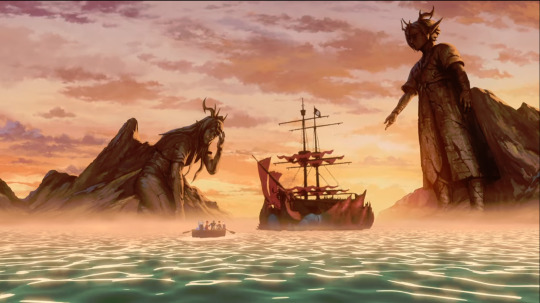
ALL RIGHT, BUCKLE THE FUCK UP:
So after my "Leola and Laurelion might be the same person" crazy, I was looking shit up to write a post about alternately Laurelion possibly being Aaravos, as in Laurelion was the immortal Aaravos, and Aaravos is the fallen Laurelion, because of this:


White as the star's heart it pierced, as in "Novablade is white, and the star's heart was also white."
Who... had the white heart of a star...

... and now... doesn't?
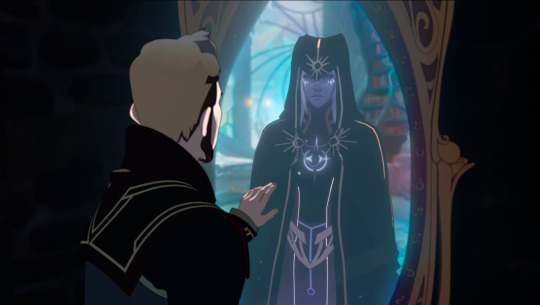
hmmmmMMMMMMMMMMMMMM
However, the problem with this is that Aaravos at least appears to go from powered/heart-ed version:
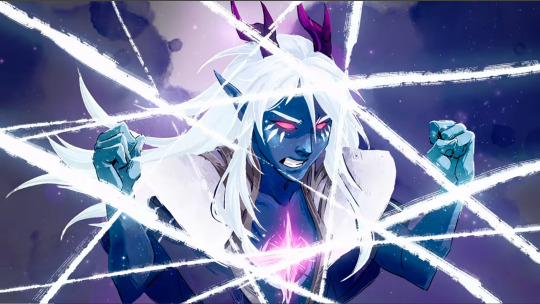
To de-powered, heart...less? version:

...when he's imprisoned. At least, according to the way Zubeia tells it.
Meanwhile, in Ripples, we see what is presumably Aaravos's actual "fall," as the "Fallen Star"—a literal descent from the heavens. This occurs long, long before the events of Aaravos's imprisonment, before dark magic, before Elarion.
I'll note that part of what I'm taking into account here is a note from the artbook on Aaravos's designs:
As a "fallen" Startouch elf, Aaravos can only access a fraction of his former power.
So it seems like the assumption to make would be that Aaravos lost his powers and status when he was cast from the heavens, which is also where I would assume Laurelion dies and Aaravos is "born" if the Laurelion/Aaravos as the same being dichotomy was in play. Then why is his heart not blackened until he's imprisoned?
One possibility is that his empowered appearance is an illusion he's maintaining—another manipulation, that's dropped when he's imprisoned.
Another possibility is this is all bullshit, and everything is as generally assumed before: when Aaravos was imprisoned, the majority of his power was somehow stripped.
Leaving that aside for a moment, let's take a look at the order of operations here, historically.
Humanity looks to the stars to save them, but the stars do not respond:

— Patience
At some point, humanity is granted some kind of blessing from the heavens, long before humans built cities and became powerful:
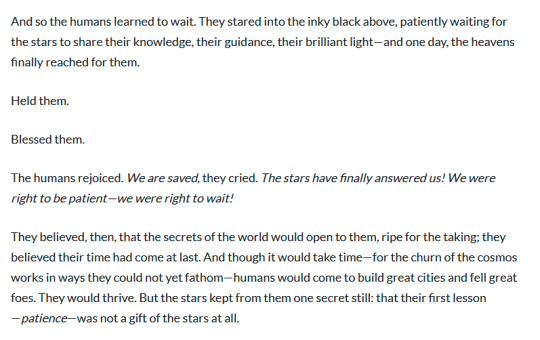
— Patience
ALSO at some point, humanity is granted the power of primal magic. By tradition this was from the unicorns, in particular Leola:
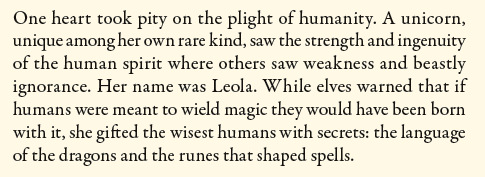
— Tales of Xadia
However, this magic is forbidden them:

— Ripples
Aaravos is cast from the heavens in a calamity that creates the Sea of the Castout—again, long before dark magic:
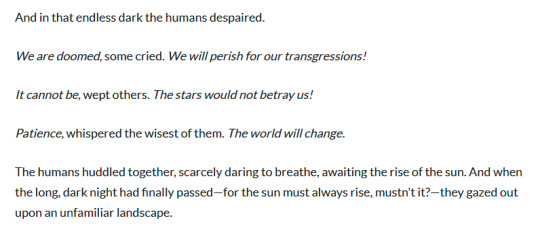
— Ripples
Further, in the retelling of this story, Aaravos notes that the stars apparently were satisfied with the results of casting him out. It scarred the land, and frightened the humans—and their claim on primal magic—into submission:

— Ripples
I'll add another note from the artbook here on Aaravos's design:
Some designs had a strong, authoritative vibe that suited other Startouch elves, but not our "fallen star."
Finally, let's look at this again:

Aaravos, obviously, on his knees and in despair. A feminine-appearing elf who is almost certainly another Startouch elf, by the horn shape and the design of the crown on her brow.
I've seen at least one person cast this as a rendition of Aaravos's punishment, in that she represents the other stars and gestures as if to say "behold how far our brother has fallen."
But y'all. Y'ALL. Please.
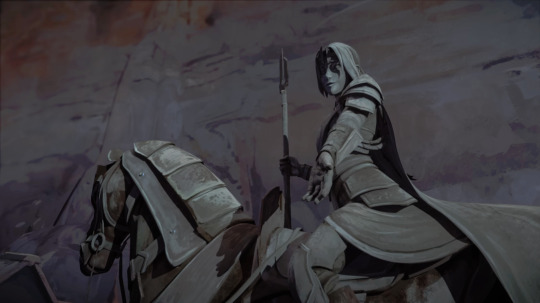
We have seen this gesture FAR too many times for it to be something else, at this point. This is mercy, and love, and the passing of a torch.
So, let me clean this up into what I think happened:
The stars are largely absent gods, indifferent to the fate of humans and interested in only their design/prophecy of the world.
Leola, another Startouch elf (or else we're gonna stretch the definition of "unicorn" pretty far), takes pity on humanity and grants them the secret of primal magic.
Leola is somehow punished for this transgression. If Laurelion is Leola, she is killed. (The Celestial elves, in this case, are the guardians of the stars' order and power in Xadia. They are the last line of defense against this sort of thing.)
Aaravos, who loved Leola, either speaks on her behalf or otherwise rebels against the order of the stars. Aaravos is cast out. If Laurelion is Aaravos, he is robbed of his heart and his power.
"Leola's Last Wish" is to continue to be a guide to humanity, through the darkness.
Aaravos, meanwhile, fucking loses his mind and decides to burn down everything. He will destroy everything the stars put in place in all of Xadia, and he will leverage humans to do it.
Aaravos begins to spin up dark magic, and when the time is right, gifts it to humanity as the inciting action of his plan to tear all of Xadia apart. More on that here.
ADDENDUM: Chatting with @raayllum immediately after writing this and they raised the possibility of Leola being Aaravos’s mother, given the parallel to Sarai in the statue, and YES that makes so much sense. Particularly regarding the star-child constellation, him adopting her crown, and why he might be punished along with her. I like this explanation better than them being lovers, even if it means TDP gains yet another goddamn martyr mother.
Anyway, that's it! Mystery of Aaravos solved.
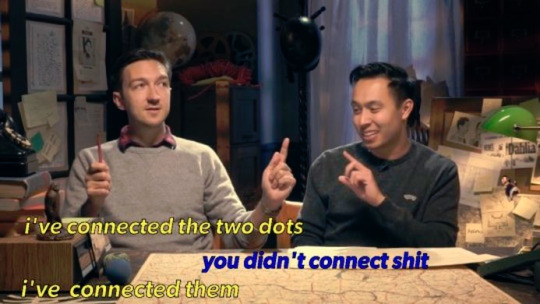
#the dragon prince#leola#aaravos#primal magic#dark magic#tdp spoilers#the dragon prince spoilers#s5 spoilers#leolavos#laurelion
853 notes
·
View notes
Text
Gift Giving & Primal vs First Elves :: Or Going Off Into the Deep Lore Deep End
Remember that meta I compiled about Greek mythology, deceptive gift giving, and TDP? Yeah it's time to talk about the gift motif properly as well as some other deep lore things because these excellent thoughts ( @spicyviren, @kradogsrats, and @its-leethee) got the wheels in my brain spinning.
AKA an unknown amount of sectioned word vomit into the nature of magic, where it comes from, how deep magic operates, some gifts and motifs, and Leola, just a little.
Let's go.
Gift Motif
The gift motif is one that's a bit of a slowburn in TDP. While characters will often pass and hand over objects — tools, artefacts, metaphorical responsibilities or trust (handing over the egg, for example) — to one another, there's not a big emphasis on gifts in the first three seasons.
There are some, such as Callum's letter from Harrow (that he's given by Claudia once again initially as a goodbye), Ezran giving Bait to Barius in S3, and Rayla's family pendant, but most of these, as you've might already noticed, are contextualized within Goodbyes. Whether the gift motif will amount in arc 2 to escaping this "final gift" context remains to be seen, but that's how it tends to work in interpersonal relationships.
There is an element of peace offering in hoping that returning Zym — a gift and/or gesture of good will — will help usher in peace, but I think (as of now at least) that ties further into the series' theme of Reciprocal Exchange (the assassin mission being an eye for an eye vs olive branch for olive branch) than outright gift giving. (Although we will probably talk about Exchange and gift giving at some point because there is also a thematic tether there.)
However, there is one other thing that is more and more often referred to as a gift in Arc 1, and that's Magic. Specifically, dark magic.
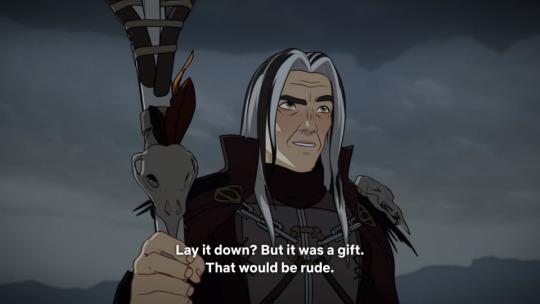
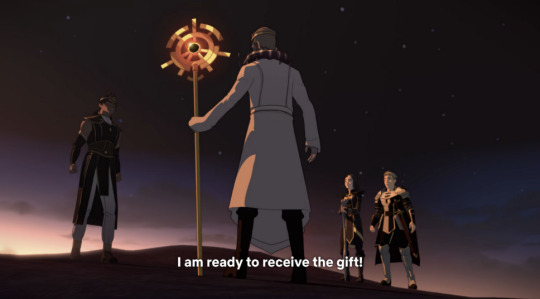
Now, this actually isn't that dissimilar from what the Goodbye gifts amount to, either. In Harrow's letter, he gifts Callum the Key of Aaravos believing it to be a powerful magical relic of some kind; Rayla's pendant makes its way from Ethari to her to Callum, who then uses it for magical purposes; and Bait, as a glow toad, is connected to an arcanum himself.
I do think it's noteworthy though that in Arc 1, (dark) magic being a gift is emphasized upon, specifically because of these lines for Khessa:
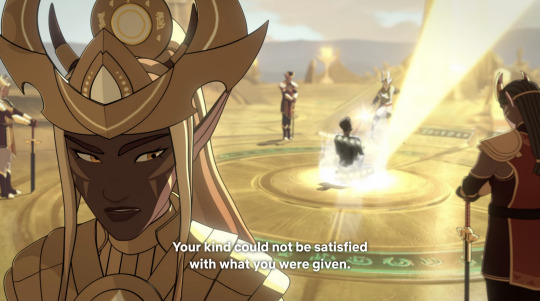
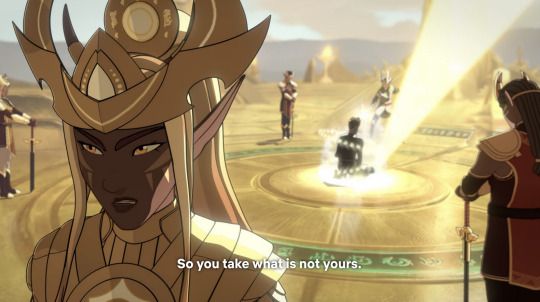
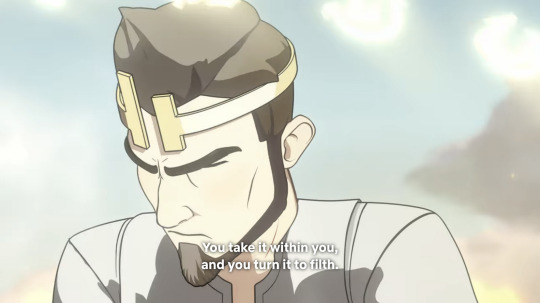
Upon first watching it back in 2019, it made sense that dark magic would be referred to this way, even when I just thought maybe it was that humans had been given 'nothing,' as Claudia says. Dark magic is closely tied to ideas of theft and thievery — stealing magic from others to harness its power for yourself — and the series is deeply interested in concepts of ownership or who has 'true' ownership over something, in magic, a throne/crown, a price to pay, etc. This follows neatly into Arc 2 (for ex: why Karim seeking to steal the Sun Seed is a metaphorical dark path even if it didn't outright involve dark magic through Kim'Dael), which we'll build on later.
That said, given the depth of the knowledge at the Great Bookery that is open to Sunfire elves more than any other type of elf, and the information that Tales of Xadia and Ripples gives us...
While elves warned that if humans were meant to wield magic they would have been born with it, [Leola] gifted the wisest humans with secrets: the language of the dragons and the runes that shaped spells. With the unicorn’s gift, the most determined minds among the humans could finally harness primal magic.
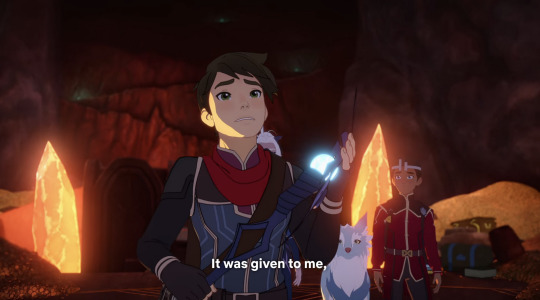
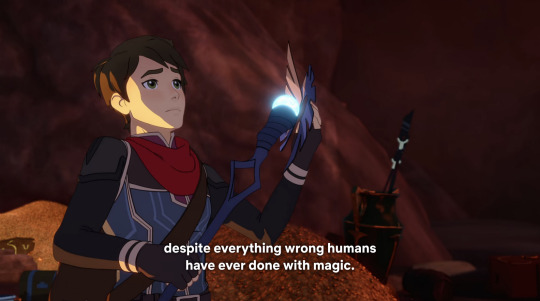
It happened long ago, when humans had only just learned to hold fire in their hands without burning. They nurtured their precious primal flames secretly—in the dark of night, beneath shadows and shrouds—as cultivating its glow drew the eyes and ire of monsters [...] Humanity had been given something it was never meant to have. And so there came a calamity.
It makes it more than likely than, unlike other elves such as Lujanne or Ibis, Khessa had reason to believe/know that there used to be primal human mages in the past... and that it wasn't 'enough' for them ultimately, because they still hungered and developed (and were given?) dark magic. "Your kind could not be satisfied with what you were given" was about the rejection of primal magic from Leola (the unicorns) in favour of a darker kind that involves theft and "dirtying yourself" (5x08) with dark magic.
But at the same time, this complicates the Gift Giving motif of including not just dark magic, but being also for primal magic — for humans, at least.
And also for elves. (Ignoring how "great orb" is very similar to "great one" for now.)
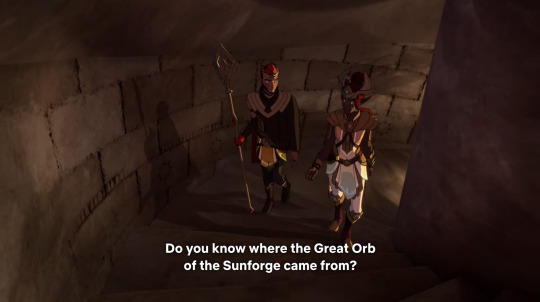
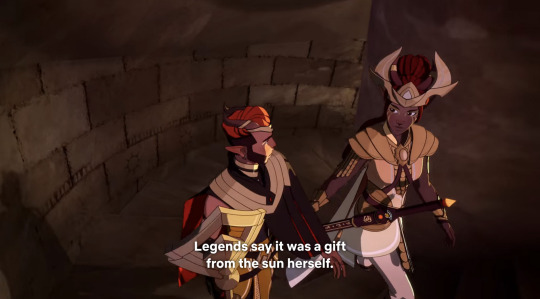
Janai: It was a gift. But there's more to it than that. The great orb began as this.
Karim: This is... a sun seed?
Now, the Great Orb being grown from a Sun 'literal' seed makes sense. We've known for a long time that in Xadia, "magic is everywhere. It's just part of the vibrance or spirit of things" (1x05). Primal magic naturally occurring in plants, animals, and elves likewise makes sense on that note. Just as not "many could bear the gruelling path of a rune mage," Karim cannot bear to have patience and faith in something that will only come to fruition centuries later.
That said, I raise the question: how functionally different is the Great Orb from say, a sun primal stone would hypothetically be? If primal stones and primal magic were gifts to humanity from unicorns — from creatures connected to the Star arcanum, for lack of a better understanding — then why not magic from Startouch (?) elves to other elves.
How do we know that all magic isn't simply a gift that was given once upon a time?
From the First Elves to the Primal Elves.
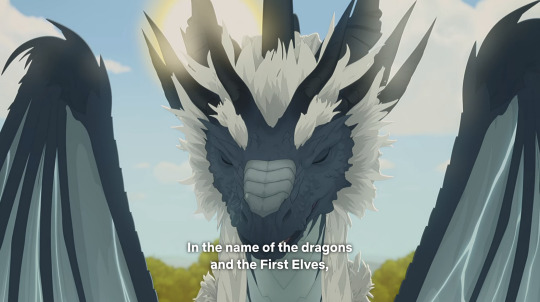
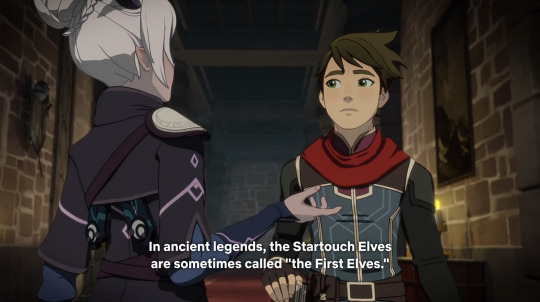
Primal vs First Elves
So what's the difference between First Elves and Primal elves?
Well we have a few pieces of lore:
1) Zubeia's status as a "heavenly majesty" (which we'll come back to in the next section) gives her authority to speak in the name of the first elves, who are effectively gods to humankind and/or Xadians ("Have our Gods died? / Where do the fabled Great Ones hide?" —the Epic of the Void
2) It seems that the First Elves are, as of now and for a while, exclusively in reference to what would otherwise be called Startouch elves, although the latter is seemingly a name that came later given Rayla's affirmation of "ancient legends". This is reaffirmed in Tales of Xadia's two lone mention of First Elves:
No group of elves presents a greater mystery than the Startouch elves. Sometimes called the First Elves, those bound to the Star primal are rumored to have made great marks on Xadia’s ancient history—but beyond story and legend, little real evidence is left to us today [...] Among the few extant records of Startouch elves are the Scrolls of the First Elves, now kept in the Great Bookery of Lux Aurea.
3) At a post-S2 con in 2019 (how's that for a far reach?) we got a timeline of the events of Xadia laid out for us. The description of the very first piece of history and era we know of goes as follows, with the Rise of Elarion happening 2000 years ago re: the Dragon Prince era ("The Return of Aaravos"):
The Era of the First elves is the first recorded era 5,000 years prior to the current era. Dragons and elves were not allied during this period. There were no distinct primal elves. This is an era before all that. Humans suffered during this period.
—2019 con timeline
4) Justin and Aaron reaffirm this at the 2:30 ish minute mark of this video (a couple of months before even S3 was released) by reaffirming distinctly to Primal elves. Later (7:40-ish mark) we see this distinction reaffirmed again through the statement of, "The patterns have been that these primal based elves have grown cultures and civilizations that have become separate and differentiated from kind of whatever the early days were with the First elves were."
Okay, so there was 100% a time where there were only First Elves, and humans, and Primal elves as we knew them (maybe still with the hands and horns, but no arcanum? Or no singular, distinct arcanum) didn't exist. Why does this matter?
This is where the deep lore timeline gets tricky, as we don't know precisely when 1) humans received magic and 2) at what stage the First Elves / Great Ones / Startouch elves 'left' Xadia, only that they did, apparently, when Elarion (the human city) needed help: "Elarion, unworthy whelp / Wept as the stars turned black the sky / They donned their masks / They turned their backs / And left Elarion to die". Why abandon the city (beyond indifference/cruelty as Aaravos would likely claim), who knows.
However, we can assume the timeline looks something like this:
Era of the First Elves
Primal elves (and presumably archdragons *) are crafted / develop into being, whatever that means
Humans are magic-less and are having a bad time
Unicorns / Leola extend sympathy despite the fact that the First Elves tell her not to (Book One: Novelization / Tales of Xadia)
Humans have primal magic (Ripples / Tales of Xadia)
This attracts negative attention, consolidated in Elarion ("the stars she asked their light to cast / and stop the dragons’ fiery might" / "as cultivating its glow drew the eyes and ire of monsters. Eventually, for the audacity of their fire, they were hunted")
Elarion asks for help and the Stars leave
Aaravos, the last star — presumably already Fallen from the First Elves — gives them dark magic under the guise of protection even though it will inevitably help him (i.e. give him the ability to possess people)
Dark magic replaces primal magic as the primary form for humans
Tension and violence escalates (unicorns are hunted to near extinction). Sol Regem is removed as King of the Dragons
Under Dragon Queen Luna Tenebris, the daughter of an elven leader suggests the Judgement of the Half-Moon, causing for humans to be banished rather than eradicated, and the continent split in two
Again, nothing too crazy / not too much we haven't already known or guessed at for a while.
But like I said, I'm gonna propose two theories, so bear with me:
Theory #1: What is Deep Magic?
The First Elves engaged with what we're gonna call Deep or Old Magic, for lack of a better term. There can be an assumption at times that this magic would be more 'pure' or less 'diluted' than dark magic or even the primal magic we've seen on screen. However, I think that's less than likely. Dark magic is often times a bad path for good outcomes, and primal magic can be a 'good' magic for bad outcomes (the blood freezing spell, for example).
While dark magic is a more textually malevolent magic system and primal magic is more true neutral — able to be used as a tool and a source of connection for the user — I don't think this necessarily means that Deep Magic is inherently enlightening (we see with the Ocean arcanum and S5 that knowledge can be an immense burden) or that it's on the opposite end of the spectrum and is outright benevolent.
What, then, am I suggesting Deep Magic to be? Well, we have some clues likewise from the same old interview post-s2 that we haven't had much basis to (potentially) understand until now, in which it's stated:
Deeper magic and deeper gifts that the original beings received [...] practical, usable, powerful magic is drawn from the six primal sources, right? But there is this idea that there's this earlier, less differentiated power kind of magic that's deeper and more - I don't kind of want to say what all of them are. It's not that important now, it has more to do with the history of beings and their interactions with each other. But Aaravos cares about some of this stuff. The best I can say is that one of them's Power — but well, what does that mean?
The six primal sources — potentially just five (hence why only 5 gemstones seem to occur naturally in nature, and Star seemingly doesn't) — are all based around physical, somewhat tangible principles. Earth, Ocean, Sun (fire/light), Sky (wind/weather) are perhaps the most tangible, with only Moon dipping into something into something more metaphysical: illusions and questioning the nature of reality, the nature of death, etc. However, I'd argue that the Moon arcanum's emphasis on death still makes it something that is particularly important to creatures who are mortal (but more on that later).
What I am arguing for is then, therefore, that Deep Magic is magic drawn from Concepts and Ideas > tangible things found in nature or parts of other magical creatures.
Three concepts, to be exact: (translated dark magic screenshot from Cartoon Universe spells reversed).
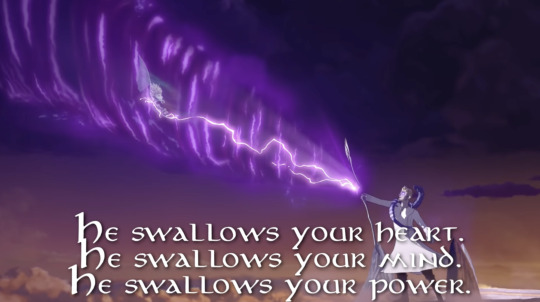
Zubeia: He chose as his instruments those who had strong hearts and strong minds, but who had an insatiable thirst and fascination with magic (power).
Three quasar diamonds, three deep magic concepts. Heart, Mind, Power.
("To know something truly and deeply, you must know it with your head, hand, and heart. Mind, body, and spirit." / "She laid before me her scales, her blindfold, and her sword, and told me to choose.")
Now, I don't know if it's these three concepts exactly — I could Truth, or Justice, or something like that — or even if it's three. But given what little we know about Deep magic thus far and how much the series' likes its threes, I think that's the likeliest number and combination.
We've known for a while that there's something weird with the connection between dark magic, spells that use blood, and 'star' magic. We know it's unlikely that Aaravos being able to possess people who have used dark magic was just a happy accident discovered after humans started using it. We know that when Callum is offered the dark magic version of the cube in his dreams, the symbol is blood red: "You can have unlimited power." And that dark magic "became the key that unlocked a place of power for humans in Xadia" (Tales of Xadia).
So what if dark magic stems from the vein of Deep magic that's taken from the concept of Power? What if when Aaravos offered his pawns "unlimited" Power, or when Kpp'Ar accused Viren of (potentially using star magic) "making the same choice you always made: the one that gives you Power," they meant it?
Alternatively, this could mean that most other Startouch elves — their longevity, their indifference — comes from the vein of Mind and subsequent intellectual detachment? Enough intelligence and reason not to hunger for more (Power), but not enough compassion and empathy to sympathize with others (Heart).
And it would also tie into Leola being unique among her own kind for her heart taking pity on the humans, and giving them primal magic — perhaps in the vein of Heart, if we're keeping things consistent — and why love ("To know something truly and deeply [...] I love you with all of myself, and I always will" / "To love is simply to know this: the tides are true as the ocean is deep") has been consistently tied to Callum unlocking arcanums. The "Narrative of Strength (power)" vs "Narrative of Love" being even more literal than we thought.
This wouldn't be too out of line since Moon arcanum philosophy already borrows heavily from Plato's idea of the forms/reality (Plato's allegory of the cave, anyone?) and the forms basically mean "your imagined ideal of the object in your mind is going to be more perfect than any tangible, 'real' version of the object could ever be." That being applied to living beings who are literally in the sky would track a certain amount, in addition to the idea that however primal magic is set up in Xadia right is "the whole world is like a giant primal stone; sky magic is all around us, and it's also in me, with every breath we take." But I digress.
With the distinction of Deep Magic as 1) separate and a sea that flows into the primal as well as 2) older and earlier than primal magic, now onto the next theory:
Theory #2: First elves and the Archdragons?
Now admittedly this one is more speculative since beyond knowing 1) the First elves = what we'd call Startouch elves, 2) the rest of them except Aaravos 'left' Xadia a while ago, and 3) the aforementioned possible 'Mind' deep magic thing, we very quickly run out of set knowledge into full blown speculation. Beyond
With that in mind, I wanna talk about the... weirdness, I suppose, between the Archdragons / draconic royal family and the First Elves.
There's a few notes to this: we know that Ancient Draconic is the language of primal magic, indicating that dragons existed and presumably had primal magic before elves did, and that elves had to be given that linguistic knowledge at least to a certain degree.
Then we also have the way Zubeia is referred to being mirrored with the way she describes Aaravos later:
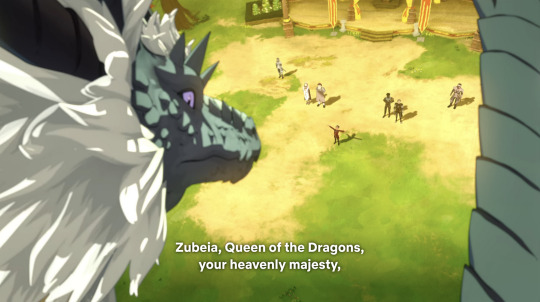
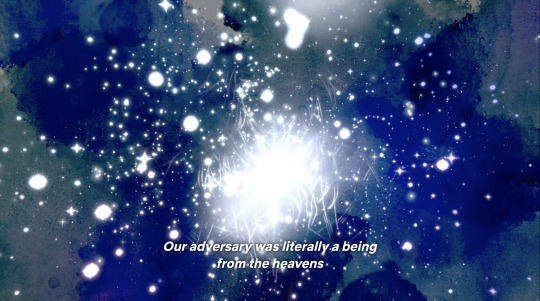
Likewise, the one person/creature we've seen referred to as a god outside the Epic of the Void poem is Avizandum by Harrow (bonus points for the game motif of "entire armies have fallen like toys" because of him):
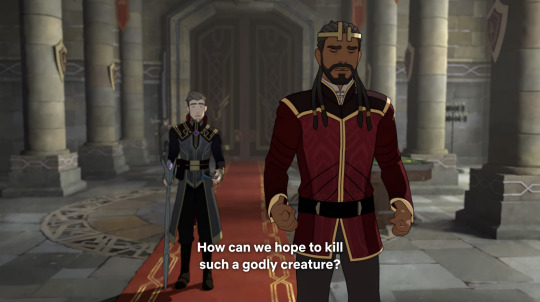
Bloodmoon Huntress also asserts that from an elven point of view (or at least Lain and Tiadrin, and presumably Runaan, too) that "Dragons are the lifeblood, the very core of Xadia" and generally assumed that dragons have the most powerful connection to their individual primal sources.
So I'd be willing to wager (esp since Sol Regem is at least 1,2000+ years old) that Archdragons at least once upon a time had been contemporaries of the First Elves if not peers. What and why that connection exists and how relevant it is for today, I don't know, but I do think there's something there, especially since the one example we have of a First Elf-Dragon relationship in Aaravos, Avizandum, and Zubeia, was perceived to be positive somewhat on all sides — a matter of trust on his end (in order to be "betrayed") and a matter of reverence and importance on theirs; "admired and loved by all" / "you meant something to him".
There is also something to be said for the Archdragons being the most powerful embodiment of the primal sources (alongside maybe some rare and noteworthy elves, like Queen Aditi) still being "unable to risk a direct confrontation" with only one singular and Fallen Startouch elf. What would a whole slew of them at the height of their power look like? (And yet it is implied that the Nova Blade is "ivory draconic" so... maybe you just have to get a First Elf close enough to the mouth to be consumed / bitten? Or perhaps the Nova Blade is made from the tooth/claw of a 'Star' arcanum dragon.)
TLDR; it's looking more and more like Startouch elves as we understand them and First Elves in generally are — while emotive and feeling the way humans and elves are — something very different from anything else we've seen thus far in terms of knowledge and power skill, and that distinction is only going to be made more and more apparent as the story goes on.
Theory #3: Where do we go from here?
So if Deep Magic is distinct from Primal, and is distinct from 2/3 kinds of Deep Magic in dark magic (derived from 5-primal and Power deep magic thoughts)... where do we go from here, magically speaking?
Well, the important thing to note is that the story has given us some thematic clues. Aaravos is concerned with exile and power, both things we see thematically most represented by human characters (with some elven exceptions like Karim and Kim'Dael). The other Star touch elves are very on brand for "Xadian exile" as their favourite punishment as well as extreme isolationism ("I knew I had to be strong alone" etc). Therefore, whatever answer we give Magically also has to reconcile these issues from a thematic and character based standpoint.
It seems like a switch of where people are concentrating energy — for Startouch elves and humans — needs to have a drastic shift to one of the other veins/concepts of deep magic that will hopefully heal the rifts. If Aaravos is Power (humans) and the others are 'Mind' (Xadian indifference/isolation and banishment) for lack of a better idea, then subverting that binary and shifting more to a third 'Love' path seems to be very on brand for TDP. Holding both at the same time but being guided by a higher principle of peace and harm reduction is what Ezran's 4x03 speech is all about, after all.
Something something both Xadia and magic and the First Elves being reunited with Xadia / humanity and elvenkind as TDP's endgame, something something.
Other Gift Giving Thoughts
The other thing I wanna talk about now that everything else is laid out is how gifts are Given, in TDP. We see time and time again relationships and magic systems being framed on the idea of whether they are giving, taking, both in a bad way or in a good way. There seems to be two main indicators for gift giving, therefore, either that in the receiver is worthy, or that the exchange is going to be reciprocal.
At its best, a gift works as intended.
Humans (and elves?) are given primal magic and generally use it for exploration and to care for themselves / one another The sun seed is given to the Sunfire elves, but they must nurture it. Callum gives Rayla her father's bow and she uses it to protect them. Callum achieves enlightenment and understanding of him and is rewarded with primal magic twice, even if the Ocean in particular is a bit murkier than he'd probably like. Gifts and belongings are relinquished or restored for freedom, for hope, for peace.
Here we have to wonder if Leola's Last Wish reconciles both the Goodbye gift motif and the gift of Magic motif, possibly resulting in the gift of the sun seed or more likely something to do with primal magic / alleviate the fallout of dark magic's consequences.
For example, to get an answer from Rex Igneous — a seeming wealth of knowledge — you have to give him a worthy gift that is also a sacrifice of some kind, according to Nath'an.
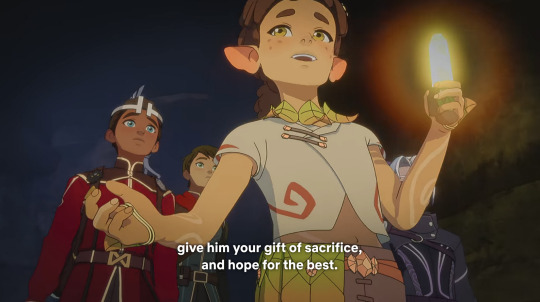
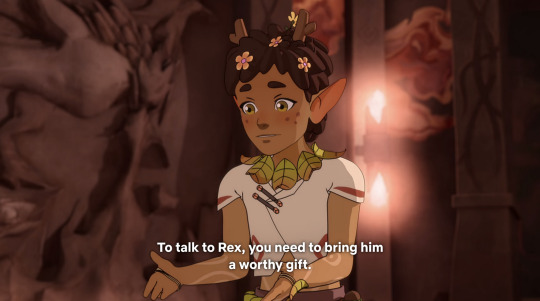
However, Ezran points out the major flaw in this line of thinking, as "We offered gifts that meant a lot to us, but the truth is, they don't mean anything to you." Not everyone is going to value the same thing or think the same thing is worth the price that was paid.
We see this interpersonally most with the mage fam ("Maybe the world would be better off without magic" from Soren, whose life was saved with it) and with Rayla and Callum (as Rayla's gift of sacrifice by leaving is something Callum did not want and rightfully did not receive well, alongside her moonstone pendant). Again: what is defined as worthy, or worthiness, is in the eye of the beholder.
Just like one of the initial thoughts that inspired this meta, Khessa asserts that dark magic is a magic that "takes" > being reciprocal for both parties, nevermind a gift. The irony, however, runs a bit deeper, as Aaravos thinks the same of his fellow stars:
But the stars kept from them one secret still: that their first lesson—patience—was not a gift of the stars at all. You see, patience is a lesson the humans taught themselves. No, the stars do not know patience, for they have no need for it. The stars want for nothing, and take all to their liking.
And we see this idea of a 'false gift' show up time and time again in the series. Nyx pretends to offer passage but actually wants to steal Zym; Rayla's act of love in leaving is a curse upon Callum's heart and wellbeing; dark magic itself is a false trade of sorts, given how unevenly it tips scales in Aaravos' favour and how much it ruins both the environment and body of its caster.
[The elven thief Lasair] never saw the precious blossoms fade and turn to cold ashes when exposed to the dawn. They never learned their gift was perceived as a curse, not a trade.
—Tales of Xadia
Kim'Dael goes to Queen Aditi under false pretences ("The Queen's Mercy") but the gift that Aditi gives her is nothing good at all:
What pretty bauble, she wondered, had she tricked the queen into forging as a token of protection? What could be powerful enough to ward away the wrath of dragons?
Just as humans sought the stars' help to protect them from the ire of the dragons, Kim'Dael sought Aditi's. And just as Aaravos offered them a false magic that would protect and ultimately trap/destroy then, so does Aditi, with magic that doesn't seem to be entirely dark or primal:
“But know this: the binding around your neck—it is made with magic not unlike your own. It is a magic that demands, that takes."
A form of magic even maybe that demands sacrifice for that kind of Power.
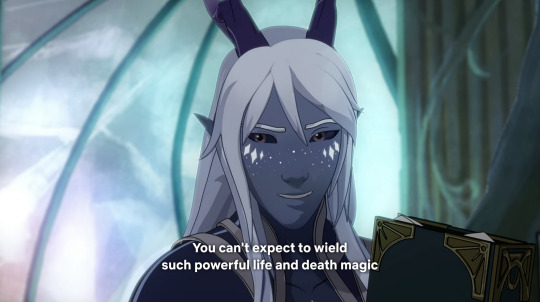
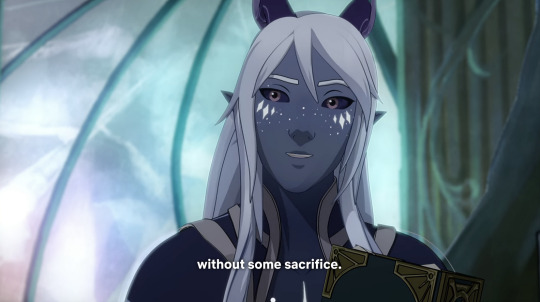
You could almost say it's something Deeper.
Conclusion
Hope you enjoyed going completely off the rails with me, and that this long (winded) post got you thinking! I'll probably do a followup discussing the implications of what we have here for potential Laurelion-Aaravos later. In the meantime, take the fruits of my labour, and spin your own hamster wheels if you'd like.
#the dragon prince#tdp#tdp meta#gift motif#analysis series#dark magic#primal magic#worldbuilding#analysis#deep lore dive#i'm also pretty sure aaravos or someone got cast out bc of the primal magic thing too#stars wanted a punishment of some kind. yeah#but more on that later#something something 'but this isn't true strength. it's only power'
46 notes
·
View notes
Text
Multiple Choice - a Callum and Aaravos theory
Not to be all Han Solo or anything, but when it comes to Aaravos and magic in Xadia, I Have A Bad Feeling About This.
If there's one thing I love more than corrupt systems, it's breaking them, so let's get to it: please enjoy yet another way that Callum's pursuit of magic could potentially go very wrong for him - and how he can still fix it.
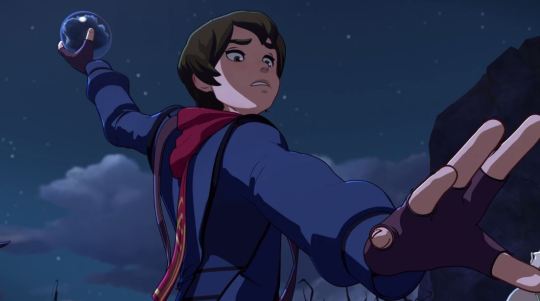
The system, in this case, isn't a monarchy (on either side of the border), wartime tensions reaching forward from the cycle, or a Xadia-wide racial hierarchy.
It's magic itself.
We don't know where it came from, magic. Was deep magic always here? Did one of the Star Touch elves create it, or perhaps choose to make it his bailiwick while others chose things like Justice and Mercy?
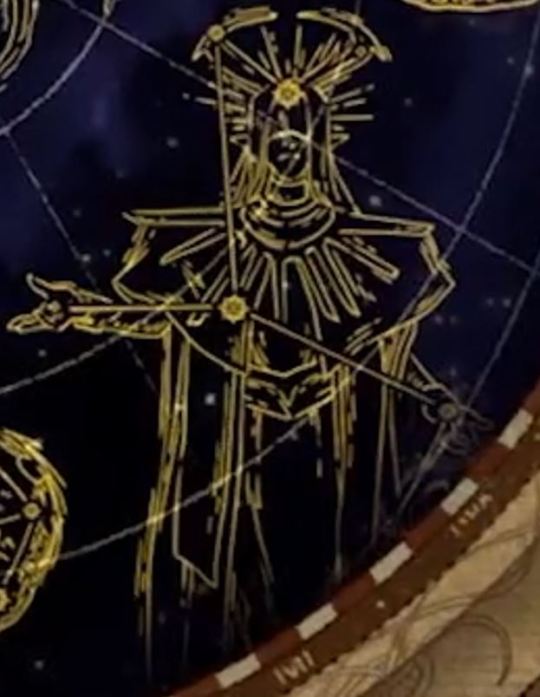
Aaravos, I mean Aaravos. If he's basically the god of magic (feel free to view him through a Loki-esque lens here, I am), then of course he's an archmage, and of course he's the only one among the Star Touch elves. Magic is His Thing.
And according to Zubeia, the Dragon Queen, its mages are his prey. We don't know yet what his full intent has been. We only have her millennia-long view from the surface of the planet. There's definitely more to the story, but which direction that story takes us is anyone's guess at this point. However, it seems clear that Aaravos's history during his time in Xadia does show a pattern of him targeting and influencing mages. He certainly has been during the years the show has covered.
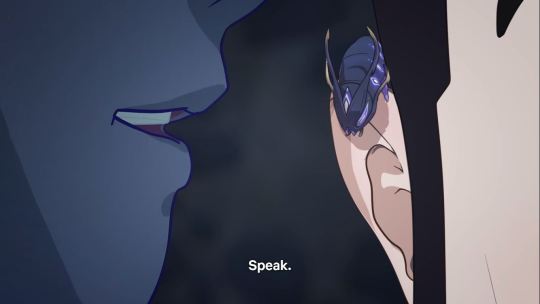
What all he did with these mages, besides the manipulation, is also still unknown. But even if all he ever did was pull their strings, he's still choosing magic-imbued beings as his favorite puppets. The most likely explanation for this is that mages and Aaravos have something in common, making them easier for him to work with. Is it just magic? Does their ambition count too? Is there more to it?
I think there's more. I feel there is some deep dangerous secret Aaravos has managed to hide from everyone so far - including us. But just because it's dangerous doesn't mean it's evil, or even ill-intentioned. Do we consider the threat to anthills when we begin construction on a new apartment complex? Usually no. We're busy doing human-level tasks. The ants' welfare is truly not our concern. And most of them will probably be fine... right?
So. What's Aaravos really up to, and what does it have to do with Callum?
Something Rayla believes about Callum made me wonder: in the short story Chasing Shadows, she believes that he, and all humans, can change their destiny (and it's super annoying!). Why is that a human thing only, though?
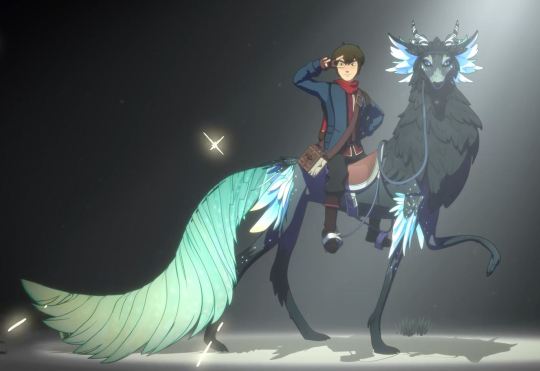
Arcanums, perhaps. We've all seen the elven peoples get uptight about their own rules and the options they can choose for themselves. It's not just the Moonshadows. Sunfire elves can absolutely be sticklers for tradition - look at my disaster boy Karim over here, willing to go to war against his own people because his sister wants to marry a human.
Bruh.
So here's part one of the theory:
Having an arcanum in you forces your destiny into a certain path.
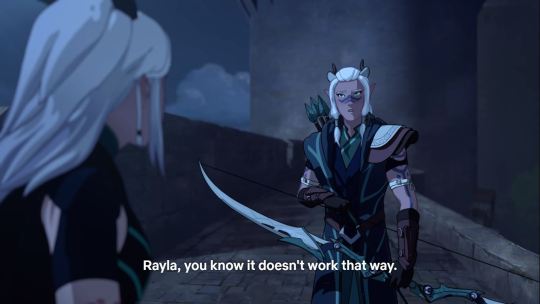
If you're born with it, you know the path of your whole life - and I don't just mean "serve your people" or "be a warrior" or "be one with nature." There is a very dark side to being locked into your destiny. It means you cannot escape it even if you desperately want to.
*wordlessly points to Runaan and his overly honorbound decisions*
*wordlessly points to Rayla and her overly sacrificial decisions*
*wordlessly points to Finnegrin and his overly fear-driven decisions*
*wordlessly points to Janai and her overly dutybound decisions*
*wordlessly points to Karim and his overly traditional decisions*
I don't need to say anything here, do I? Thought not.
But it's one thing to be born with an arcanum - maybe they know and accept this part of their destiny already. Maybe it's just a subconscious thing they... know.
It's another thing entirely to opt into an arcanum as a free choice. And here's where we get to part two:
Callum thinks he chose his destiny. He doesn't know he just gave it away.
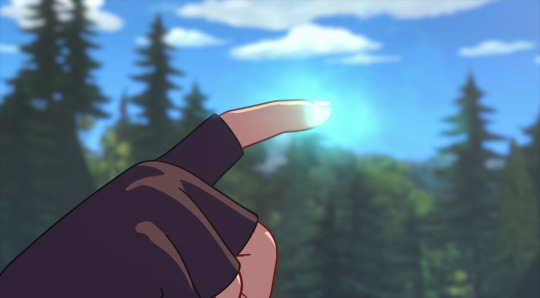
If he just handed his fate to Aaravos by embracing an arcanum (and then one more), his destiny isn't currently in his hands at all. It's in Aaravos's. And the archmage has proven that he, at least, knows that, since he's been pulling at Callum's strings and toying with him for a while now. He wouldn't flex like that unless he was supremely confident - which he is, he always is - he wouldn't show that hand early on like this unless he knew Callum didn't understand what he'd done or how to reverse it.
This theory is about more than dark magic. It's about all magic. Even if Callum could cleanse himself from dark magic and never let Aaravos puppet him again, is he really free? He still has an arcanum. Where did that come from? He's walking around with a couple of magical bona fides stamped on his brain, and I just want to know...
Who crafted the stamps?

If all Xadian magic is some kind of... creation, or spill, or experiment... and Aaravos needs that power back for himself in order to be who he used to be and/or re-ascend to the stars, he's got more than one way to harness it again:
dark magic consumes primal magic - but matter and energy are never destroyed, so... where does that power go? Aaravos has a very convenient black hole symbol right on his chest. Maybe every spell dark mages have ever cast sends him some of his precious primal magic again. It would be a very convenient way of getting desperate humans to do his cleanup for him. And he has all the time in the world.
primal magic won't save anyone from his will - it just harnesses the elves to Aaravos's magic rules and binds their destiny to a predetermined outcome. They've become, in a word... predictable.
There's no way to beat a Star Touch Archmage at his own game. He literally wrote its rules. So what's a bright young kid like Callum to do?
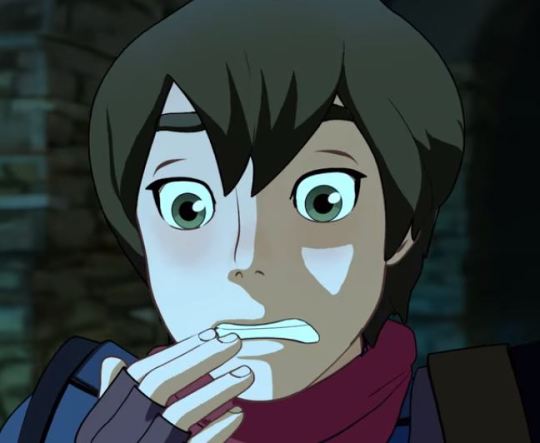
To quote War Games, "the only way to win is not to play."
Callum's in a unique position, in that he knows who he was before he had an arcanum. Back when he could choose his destiny every day, without binding him to some powerful force he doesn't fully understand yet. This might lead him to a very difficult and dangerous choice, and it could break the game, and the world, wide open.
If Callum can choose to learn an arcanum, maybe he can choose to forget one.
If he can un-know the things that bound him to that magic destiny, he'd be free again, of Aaravos's reach and of his influence.
And that's just for him, but if everyone else is trapped too, how can he help them and hurt Aaravos's power grab at the same time? No idea, beyond "someone hand him a powerful magical artifact and wait," at this point, but I'm sure he'll find a way to break something important eventually! Something vital to the structure and distribution of magic itself, preferably.
If he manages to find a way to destroy magic itself, then everyone would be free. There would be no rules binding anyone to Aaravos. There would be no dark magic feeding off its fumes, either. It's theoretically possible that destroying primal magic would undo the taint of dark magic, all in one go.
And we all know how Callum loves to go around ruining ancient and powerful magical objects. Kid's got quite a track record by now!
Maybe he's not done yet. Maybe Callum's true destiny will be both Savior and Destroyer. But he'll have to play his own game to do it - he can't play Aaravos's game and win. He'll have to fight outside of magic itself. And if he's going to put down his most powerful weapon, forged by someone else - by the mastermind himself - and try without it, then he'll need help, just like always.
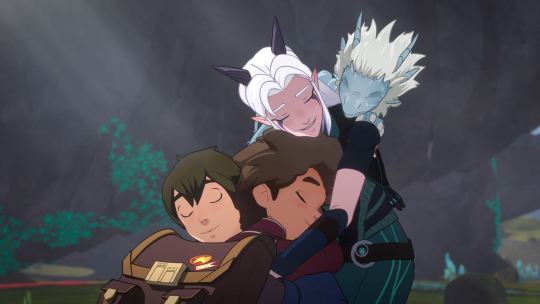
41 notes
·
View notes
Text
"Callum is so morally dubious"

Also, before people start with the "Ezran is only a child!" and "Rayla is traumatized!" Callum is also a child and also traumatized. Either that works for all of them or none of them.
45 notes
·
View notes
Text
Just wondering at how relatively unheard-of Callum's feat of being the "first human primal mage in centuries" is. The news doesn't appear to have spread very far beyond Katolis proper and the principal leadership of Xadia.
We don't get to witness much of Callum's day-to-day work as the High Mage, but he doesn't seem to be entertaining ranks of curious scholars or historians vying for interviews. The citizens of Katolis at least are acquainted enough with Callum's spellwork to accept demonstrations of it with familiar awe, but otherwise he seems to be as relatively unpopular as he ever was.
Someone as supposedly well-traveled and worldy as Nyx reacted to Callum's boast of being a primal mage with reflexive incredulity. She characterizes all human magic as essentially sleight-of-hand. It's still common knowledge that humans can't wield primal magic. (She does not even bother to mention dark magic at all; revealing that she probably holds the mainstream Xadian opinion that we've heard of before from Lujanne, "we do not call that practice magic. It's an atrocity").
Surely rumors have traveled; but, given Callum's apparent anonymity and lack of fame, I wonder if the news had all been similarly disbelieved and dismissed.
#tdp speculation#the dragon prince#primal magic#i also think about how little magic must affect the daily grind of a commoner (human or elf)#given the lack of dark mages and magic in the human kingdoms#and while magic permeates the land of xadia we don't see it employed much except among the elites#so that news that a human is using primal magic is received with either skepticism or apathy or both
40 notes
·
View notes
Text
After watching The Dragon Prince s5
I realized
All this stuff we've been doing to ourselves, bottling up our feelings and living with a mentally unhealthy routine, saying that "It's easier somehow".
We're like Claudia.
Performing dark magic because it "Has to be done" to save her father, protect her family. And she didn't win in the end. Her spells always failed after a while. And what happened to Viren, embodying dark magic his entire life and realizing the truth only at his death. You get what I'm saying? The stuff that humans aren't supposed to do to themselves is like dark magic.
We gotta try primal magic. Callum found a way. There's always that pure way. Primal magic will probably save you from the bottom of the ocean (or the bottom of your shower). Primal magic is expressing your feelings, acknowledging what needs to be acknowledged like the inability to control everything in the ocean.
Dark magic is going to eventually kill us.
Let's figure out how to use primal magic.
#the dragon prince#tdp#callum#rayla#claudia tdp#viren tdp#aaravos#dark magic#primal magic#primal magics gonna save us yall#just gotta jump off the top of the dragon queens lair and grow wings to save that one moonshadow elf that tried to kill you a lil while ago#and then dramatically fly across a sunset#well done rayllum#rayllum#i might be ranting here idk#BAITLINGS
68 notes
·
View notes
Note
I think that instead of using the quasar diamonds, Callum will connect to the star arcanum? Do you agree?
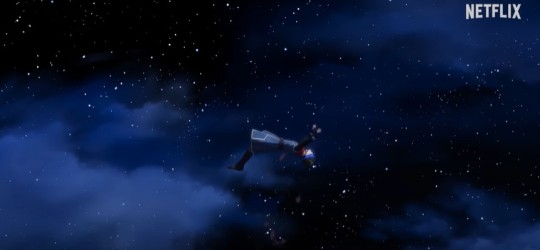
Given this image, he'll connect to the arcanum of the stars. But for that, he'll first have to understand the arcanum first. In Lux Aurea's library, he spoke of a star spell that unites body and mind. And I think that even if he connects with the arcanum, he'd need the quasar crystal for the spell, since if I'm not mistaken, the quasar crystal has to be used.
12 notes
·
View notes
Text
#the dragon prince#tdp#tales of xadia#primal magic#primal sources#sun primal#moon primal#star primal#earth primal#ocean primal#sky primal
120 notes
·
View notes
Text
Janai: You may not travel to Lux Aurea. As Queen, I forbid it.
Callum: You’re not my queen, that’s not going to work!
Janai: Ok then as your aunt I forbid it!
Callum: Awwww…but still no.
#the dragon prince#tdp#callum#rayla#rayllum#ezran#soren#aaravos#viren#primal magic#janai the dragon prince#tdp amaya
2K notes
·
View notes
Text
Where DO the fabled Great Ones hide?
So recently pulling together that in Xadia there were initially only the first elves, then there were primal elves, and then eventually there were no more first elves... we've been left with the question of how and why did primal elves come into being, and correspondingly, where did the first elves go?
To get a sense of timeline: if Aaravos is, as he claims in the Book One novelization prologue, one of the first elves, there were presumably still at least a few around as recently as 1000 years before series time—at least, if we're to believe that Ziard's "one of the great ones" answer for who gave him the staff is obfuscating that it was Aaravos for anyone other than the audience (which it may not be). The shift from "first elves" to "great ones" implies that they are, at the least, vastly inferior in population to the primal elves. Then by 300 years pre-series, all but Aaravos are gone—when push comes to shove, only the archdragons contend with him (there are none of his kind standing against him) and he has no allies (there are none of his kind standing with him).
The neatest, though by no means only, conclusion to draw is that the first elves somehow became the primal elves. But why would they do that? By all accounts, it's a definite step down—Aaravos can draw magic from any primal source, but we have yet to see a primal elf with magic beyond their own primal. Star, if it can truly be considered a primal source, is also implied to be stronger than the others, so cutting it off in order to dedicate yourself to another single primal isn't doing you any favors. And I mean, come on—primal elves are mortal, and we're given to believe the first elves were not. If some of the first elves became the initial primal elves, it seems like it would have to have been either a significant sacrifice on their part or something that was done unwillingly. Which means we're getting juicy.
Here's five far-fetched but 100% serious theories:
Theory 1: Primal elves for primal stones
This depends a bit on the exact relationship between the first elves and primal magic, which we don't know for certain—one possibility is that the first elves had equal access to all available primal sources as well as deep magic, but another is that primal magic was the sole domain of the dragons and other mortal creatures of Xadia. Aaravos has mastered magic of all primal sources, but I have to wonder if that was only because he was "fallen" and stripped of much of his natural power. Given that we see him cast primal magic with runes, it seems possible that primal magic is not native to the first elves the way it is to the dragons—Zubeia doesn't need a rune to cast Vocare Nimbum. If first elves had a similar natural ability with deep magic, that could put them on par with the archdragons in their power... and even if Aaravos was stripped of his deep magic ability, becoming an archmage of all primal sources would still make him a formidable opponent for Avizandum and Zubeia.
Anyway, if there were the first elves, with only/primarily deep magic, the dragons/creatures native to Xadia with only primal magic, and then humans with no magic, giving the suffering humans access to primal magic as a leg up makes sense in that it puts them on equal ground with their peers (the other mortals of Xadia) without elevating them too far. So what if, to craft the first primal stones and teach humans primal magic, Leola and her cohort had to become primal elves and bind themselves to a single primal source in order to understand it so thoroughly that they could trap it for use? I've theorized before that creating a primal stone requires star magic, but it definitely also requires magic of the primal that is being stored—if the first elves were not naturally primal mages, it may have been a necessary sacrifice. This would also complicate the "gift" of primal magic in that not only was it not intended for humans to receive, it wasn't Leola's to give in the first place.
Theory 2: Punishment that suits the crime
a.k.a. "well if you love primal magic and mortals so much, why don't you marry them"
Short and sweet counterpart to Theory 1: the punishment for Leola and her cohort after giving humans primal magic was to have most of their power and natures removed through becoming primal elves, mortal and chained to a single primal source.
Theory 3: Pacifier for the archdragons
At the time of the show, the primal elves don't seem to worship the archdragons, but they do serve and revere them. However, it's strongly implied that at least some primal elf cultures worshiped at least "their" archdragon—the specter of Sol Regem is basically inextricable from Sunfire elf rituals, and Rex Igneous demands extensive tribute essentially in sacrifice to him. Also, if there's one thing we know about archdragons, it's that they're proud to the point of arrogance. With the first elves as their peers, how would the dragons feel about humans directing their attention and worship to the stars? Probably not thrilled!
In that situation, it's possible that the first elves decided to create new elves in their own image, but bound to the primal sources and subservient to the archdragons, as a gesture of goodwill (possibly while rolling their eyes) to keep the peace (and stop their whining). Those primal elves then multiplied, formed their own societies, etc.
This one does leave the question of "... then what happened to the first elves?" but still. Though it could coexist nicely with the next...
Theory 4: Imitation is flattery
Honestly kind of stupid counterpart to Theory 3: it's the archdragons who decide to create their own primal servant copies of the first elves. Could they do that? Big shrug. Could they do it with the help of Someone(tm) among the first elves? ... slightly less big shrug.
Theory 5: A Lost Midnight War
I fully admit that I'm going kind of insane, BUT hear me out. In Patience, Aaravos asserts that after the gift of primal magic:
Humans would come to build great cities and fell great foes. They would thrive.
"Build great cities?" Yeah yeah, Elarion, we've all seen it... but wait, what was that second part? Exactly what great foes were humans felling? That seems kinda important, given how the politics of the time are described, but Aaravos chooses not to elaborate.
Then in Midnight Star we have the story of a situation where Elarion, in her tenacity and kindled power, attracts the ire of the dragons and is abandoned by the stars that she thought were her benefactors—except for Aaravos, who gives the saving gift of dark magic. The poem has a kind of compressed and figurative timeline, in that (as known from Ripples) humans received primal magic before Elarion's rise, so the impending doom in Midnight Star can't be the calamity of Ripples. That was also a punishment meted out by the stars rather than the dragons. The threat in Midnight Star also can't be the implied razing of Elarion concurrent with or following the human expulsion, because the implication is also that this is when Aaravos offered dark magic—he can't be only just now offering the thing that was the cause of the dragon's wrath in the first place.
So here's a theory: sometime in the intervening however many thousand years between humans receiving primal magic and dark magic, some kind of conflict arose between the remaining first elves and the archdragons. Humans having been given primal magic by some faction of the first elves (whether or not they were punished for it) and their subsequent rise did not help matters, and could possibly even have been the cause of the conflict in the first place. The archdragons, for whatever reason, came out on top—maybe there was internal strife among the first elves, or maybe their numbers had already diminished. The remaining first elves are given the choice of submitting to the archdragons as primal elves ("donned their masks") or leaving Xadia forever ("turned their backs"). Either way, humans were abandoned to their fate, and Aaravos is the "last" star remaining on Xadia proper.
The poem is very figurative overall, but particularly in its final stanzas—Elarion is a "dying husk," but Aaravos's gift revitalizes her to be more powerful than ever. My interpretation is that for the entire poem, "Elarion" has been a stand-in for humanity in general, possibly without any relation to the city of Elarion at all, and what is being described by "dying husk" could be the period of human suffering that preceded dark magic. We know that Elarion had a prolonged rise and golden age of literally a thousand years before humans were expelled from Xadia, and yet we are told that before dark magic, humans were weak and starving—either that's a straight-up lie (entirely possible) or something happened to cause human fortunes to change from good to bad. Something like... a period of direct and brutal punishment and oppression from the archdragons and their servants. Maybe at the time the poem is describing, Elarion the city was destroyed or hadn't even been built yet, and the eventual flourishing city humans are exiled from is built on the strength of dark magic, after all. (As I mentioned elsewhere, it's getting more and more to a point where the timeline simply doesn't make sense if Ziard was truly the first dark mage ever, rather than just the first one Aaravos manipulated into causing problems on purpose.)
Anyway: the first elves, facing defeat, either assimilated as primal elves or left Xadia entirely. (Or a secret third thing, as with Aaravos, possibly related to his "fallen" status.)
Also "elves either depart the world forever or choose to become mortal" is another very Tolkien thing, like just saying.
Bonus cursed theory: primal elves are the extremely unlikely offspring of first elves breeding with humans. I'll actually be really mad if the real answer is something that garbage, but if I have to think about it then you do, too.
Double-bonus EXTRA-cursed theory: primal elves are the extremely unlikely offspring of first elves breeding with dragons. I'd still be mad about this one but also kind of impressed that they went there for real.
31 notes
·
View notes
Text
This post from @imminent-danger-came got me thinking about the sun in TDP, well, and let's look into it
First things first:
The Sun in TDP is, currently, set in the most opposition to dark magic. Some of this is because the other primals are relatively unexplored (Earth), are thematically adjacent to dark magic (Moon because of death/deception, Star for obvious reasons, Ocean more recently) or exist on a meta level but not an in-universe one, i.e. Sky magic is set in opposition to dark / star magic through Callum ("my breath for freedom") but we don't know enough about Skywing culture / seen enough Skywing elves to know anything beyond him.
Meanwhile, the absence of the Sun is often seen as synonymous with dark magic
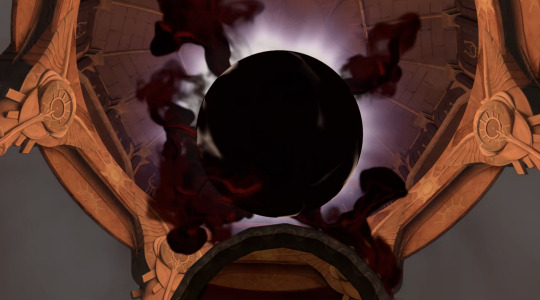
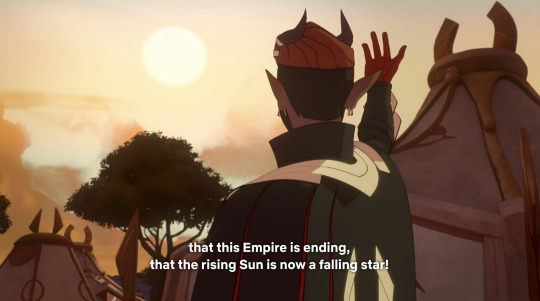
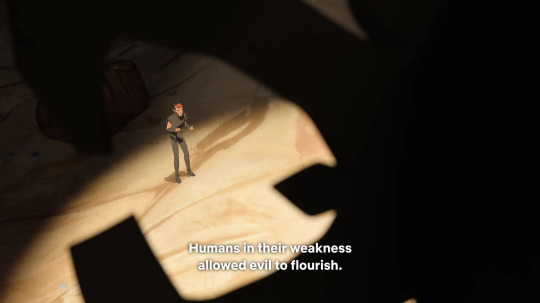
and/or is used to purify / hide and reveal dark magic within the text.

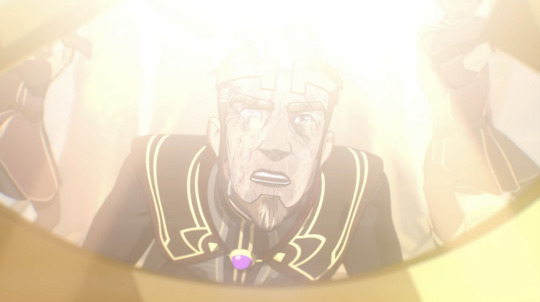
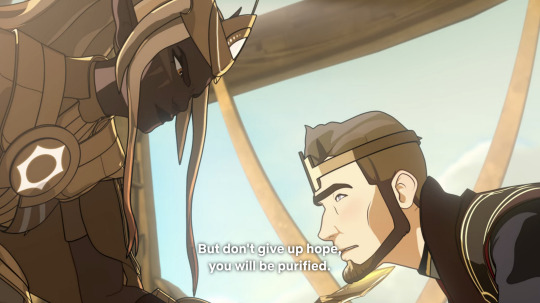
There is a reason, after all, that Karim believes if he can heal Sol Regem's eyes — if he can get rid of the dark magic — that it will let Sol Regem "convince [his people] that the sun will shine again." That Karim thinks "the sun will never shine again for me" is related solely to the physical affects of dark magic, and none of the emotions Sol Regem has felt ("I lost my hope long before I lost my sight").
We see this dichotomy of light being more good and nighttime/darkness being more bad even in S1, as Harrow and Viren hope to find the Moonshadow elves ("in the light of the day") before they become unstoppable / death incarnate at night and at the Cursed Caldera, in which Ellis asserts that come nightfall, "the nightmare is about to begin".
However, as you can probably already tell, this relationship of Sun vs dark magic as oppositional forces is already more than muddled just as the dichotomy of light = good and dark = bad in the show is, too.
We see this prominently with the repeated combination of corrupted Sun magic not only in the hearts of cinder spell that Viren used the relic and sun staff to create, but also in Claudia's continual wielding of the corrupted sun staff
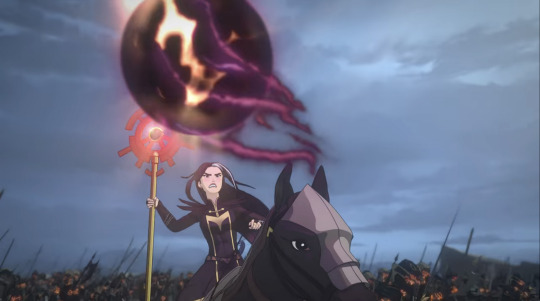
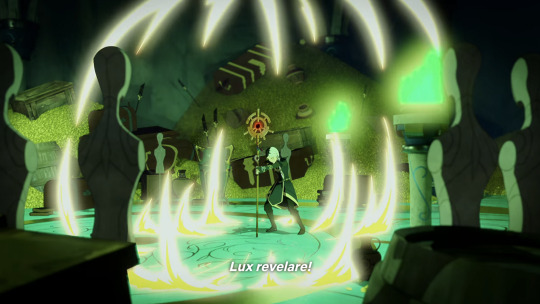
and in Karim's employment of Kim'Dael. Karim just implied that humans allowed evil (dark magic) to flourish because they were weak ("You are lesser beings") just as Sol Regem believed, and it seems Pharos is thinking along the same lines here: isn't Kim'Dael "evil" because she uses dark magic too?
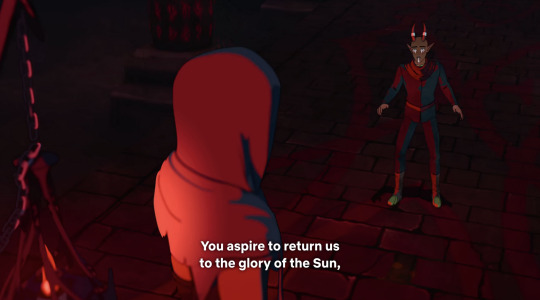
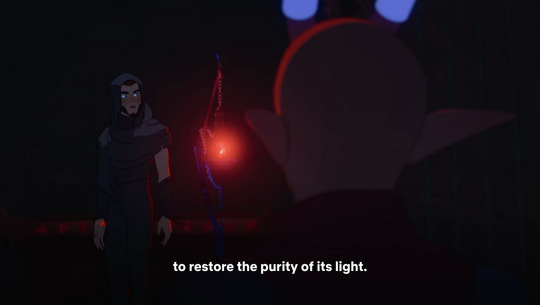
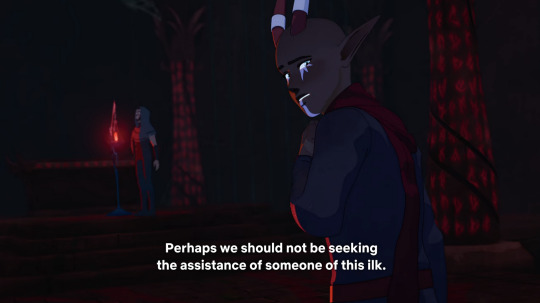
Because she's a Moon dark magic, and the opposite of the Sun and purity and light in every way he can think of, even when Pharos — a Sunfire priest who believes in Karim — has been corrupted and infected, too. And yeah some of this is to point out Karim being hypocritical and losing his way and inevitably things, such as him having the Sun Seed, are not going to go according to plan.
But I do want to take it one step further and say that the Sun — seeing a new day — is not necessarily void of dark or Star magic-y connotations, after all.
Whether it's the importance of the Sun's first light, spoken by mages who are either unknowingly (and likely to be) pawns of Aaravos
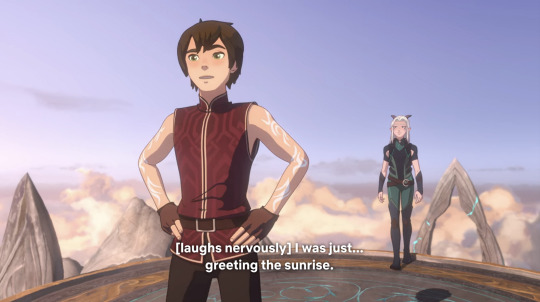
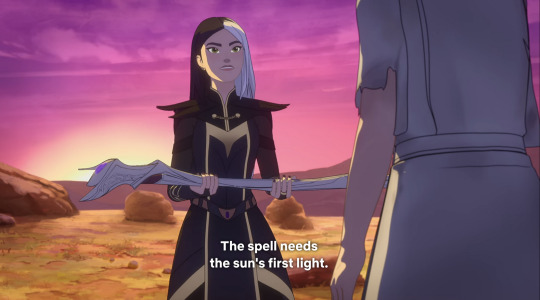
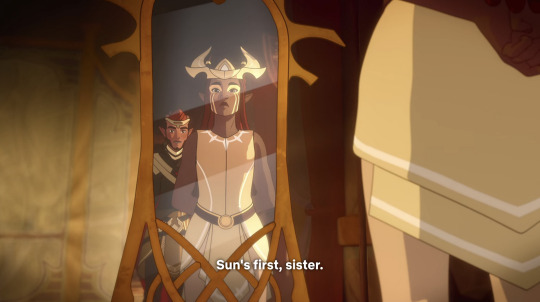
or that doing dark magic and playing into Aaravos' hands would've secured Viren seeing a new day.
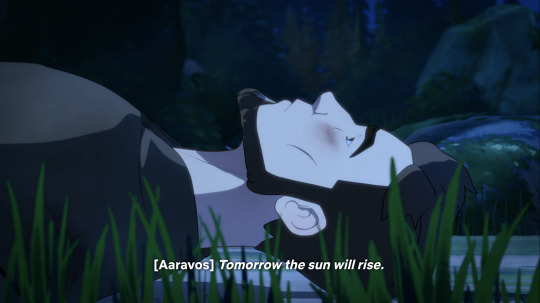
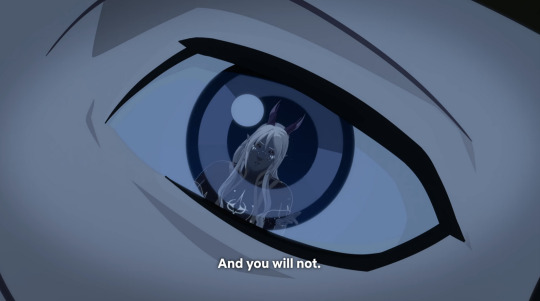
Although dark magic is, seemingly, more associated with night because, well, darkness, obviously...
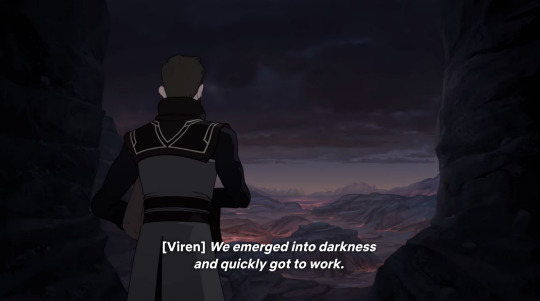
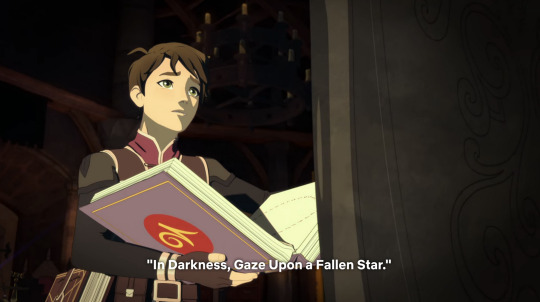
It's not just that the Great Orb was corrupted, but that Lux Aurea itself fell, giving way to corrupted creatures, infected by another combination of Sun and Dark magic
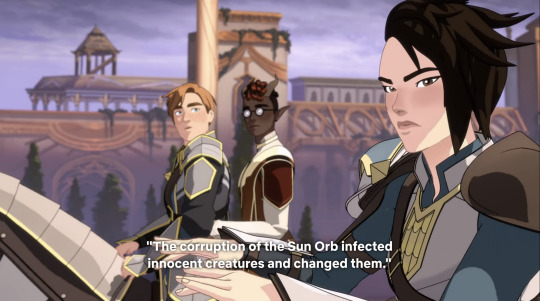

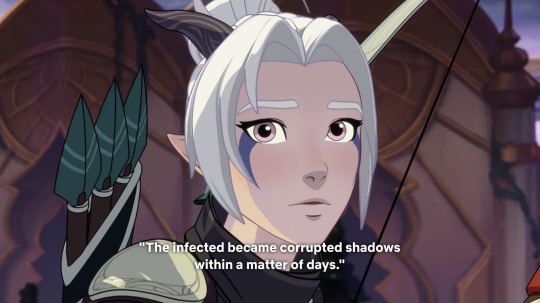
It's that dark magic, I think, grows and festers and consumes everything until light and dark — day and night — are synonymous with each other, until they become a singular thing like Aaravos. That there's no escaping it. There's no "choice".
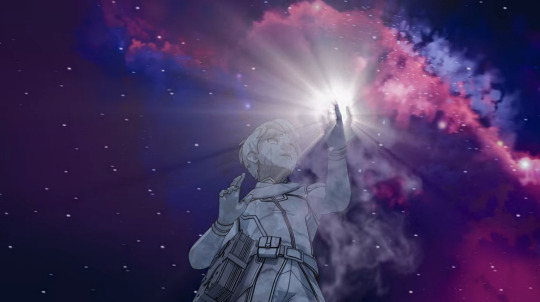
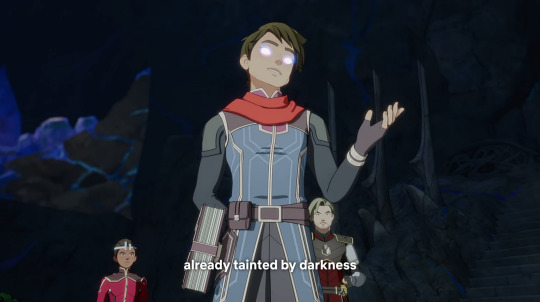
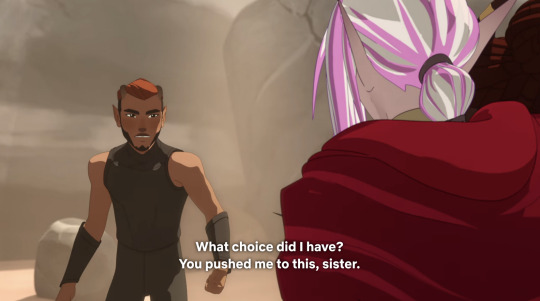
Or at least, that's what it wants you to think.
#tdp#tdp meta#the dragon prince#analysis series#primal magic#dark magic#analysis#parallels#multi#i feel like i lost my thread half way through but listen. i had fun#light and darkness motif#theme: duality
48 notes
·
View notes
Note
What is deep magic?
good question! i will try my best to answer with the limited knowledge i’ve absorbed by osmosis from reading discussions of interviews from the creators and breakdowns of the trailers and canon adjacent fanfic/fanon explanations
by deep magic i assume you mean proto magic if they’re the same thing?
i’ve heard around that aaravos is supposed to be giving a speech on it in season 5.

probably in this scene?
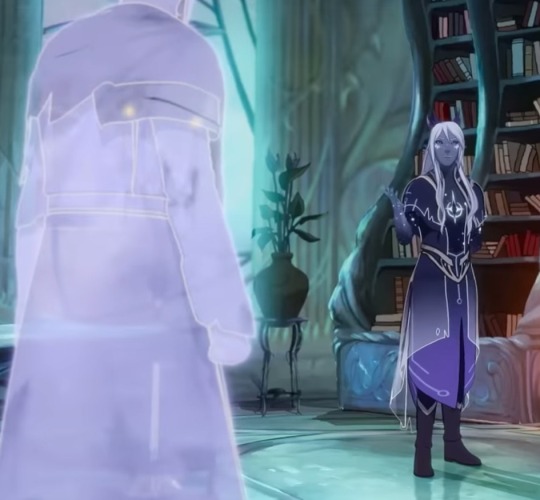
i’d guess it’s the primal stuff before it differentiated, like a stem cell, which can grow into stomach cell or muscle or bone or nerve or skin. like how everything’s connected. maybe, before there were startouch and tidebound and earthblood and sunfire and moonshadow and skywing elves there were just elves and they just used protomagic.
but also, the sun is a star and the stars are in the sky along with the moon which controls the tide which waters the earth, so it’s all connected, and if the world is one big primal stone full of specific arcanums for connected creatures to draw upon, maybe it’s all just protomagic, but it’s easier to cast spells if they’re associated with a specific source.
like is it even possible to cast a spell that is strictly protomagic and not connected to a certain source?
anyway those are my speculations lolol thanks for the ask anon!
i have a question in return for y’all. as we saw corrupted sun magic but it appeared different than dark magic, is there a corrupted form of each arcanum, and a corrupted form of proto/deep magic? or would that be dark magic itself, non specialized? ¯\_(ツ)_/¯
#q&a#proto magic#protomagic#the dragon prince#tdp#tdp protomagic#deep magic#idfk#aaravos#primal magic#tdp speculation#thanks for the ask!#i want to theorize with fellow tdp lovers so pls share ur thoughtsss#tdp meta
26 notes
·
View notes
Note
Do you think that Callum unlocking deep magic could cause him to invent a better magic system?
Ooooh, that’s a very interesting question.
So before I can answer this ask properly, I’ll explain what I think deep magic actually is.
A few years back I made a theory post detailing what I believe deep magic to actually be, and to summarise what I’d said there:
I think deep magic is the underlying core of all magic, the base component from which all other magic is then created, and which all primal sources have in common (like a common denominator of every primal magic spell). When you remove all the various attributes from the other sources (fire from sun, earth from…earth), then what you’re left with is “pure” magic. Aka deep magic.
What that aforementioned post also proposes is that if you could tap into that deep magic and control it, then you should technically be able to control every kind of primal magic to a certain extent (since deep magic is maybe contained in every form of magic).
This was my original theory as to how Aaravos seemingly mastered all six of the primal sources; he simply found a way to control deep magic. These days I don’t think I’d brush him off as „just“ a deep magic user rather than a master of all six sources, but I still think it might’ve played a part in that.
Now to your actual question @dragoncoreice :
Could Callum invent a better magic system using deep magic?
Here’s the thing;
The world of Xadia is built with and upon the six primal sources. Regardless of how they’re getting used, they are the basic building blocks of this reality. So they’re always going to exist in some way, and they aren’t going to be replaced, which I doubt would be even possible.
But I do think that this system of six primals can be improved.
One gripe that I’ve always had with magic (and elven societies for that matter) in the tdp universe is that it’s seemingly so segregated:
The sunfire elves only use sunfire tools, the moonshadow elves only live in villages in this one particular forest, and the ocean elves stay in the water. There seems to be very little exchange happening between the elves and even the dragons, with most of them keeping to their own people and communities, unless they have a practical reason to interact with another.
Similarly, there seems to be no blending of magic in Xadia: every magical item, spell or living being (save for Aaravos) is strictly tied to one primal source, and can only exude magic from that source. Yes, someone can cast magic from another source if it’s in the form of a magical stone/gem or plants, but even then, it’s technically the item doing the magic, not the person.
That is where I think deep magic could help.
If every primal source has the same base component, then it should be possible to combine or even blend different types of magic using that component [deep magic].
So instead of needing to rely on a tidebound elf or an ocean gem to perform a healing spell, a moonshadow elf could tap into deep magic and use that to then indirectly use a nearby water source to cast a healing spell. It may not be as good as from an ocean mage, but it could do the trick.
Or a sky mage could tap into deep magic and use it to sow fire magic into a lightning spell, and create whole new spells that are built from TWO different primal sources.
Once the merging of different types of magic is a thing, a whole world of new possibilities opens up and creates opportunities for new inventions and extraordinary new spells unlike anything that was seen before. And technically it would still be based on the six-primal-sources-system, but better.
So to put it shortly: no, I don’t think discovering deep magic could allow someone to invent a whole new magic system that replaces the old one. But I do think that it could greatly improve and enrich the current one.
Now, wether Callum is the one to unlock deep magic or not is left to be seen, but knowing how passionate he is about magic, he’s definitely going to get involved with it. Once he does get his hands on it, he’ll want to play with deep magic and see where he could go with it.
But considering how one of the shows most prevalent themes is about unity and teamwork, about how working towards a shared future and helping each other out is better than being alone, I wouldn’t be surprised if this revolution of magic didn’t come from Callum alone.
He might instigate it, yes, but I could really see him actually reaching out and teaching others how to tap into deep magic, so that anyone could go and invent new spells and magic; so that everyone has the chance to change the world.
~~~~~~
Thanks for reading✨
Feel free to reblog or comment with your own thoughts and ideas!
#tdp#the dragon prince#tdp theory#tdp headcanons#tdp meta#tdp speculation#tdp callum#tdp magic#tdp deep magic#deep magic#tdp theorist#tdp primal magic#primal magic
20 notes
·
View notes
Text
What kind of magic does the Jailer use, and what is her connection to the Key of Aaravos?
I have thought for a while that perhaps the Jailer is neither a primal nor a dark magic user, and that she utilized the Key of Aaravos to serve an important role in his imprisonment. Now, there isn't a lot of overt evidence for my hypothesis here; this is a ramble of pure speculation. I'm going to do my best to present the dialogue and canon-consistent logic to support my thoughts. Here goes:
The prevailing opinion in Xadia is that "human magic" is akin to trickery and sleight of hand. When confronted with Callum's claim of being a primal mage in 5x07, Nyx dismisses his boast reflexively: “I’ve seen ‘human magic.’ Fake ropes, false doors, birds and rabbits stuffed into clothing.” To her, it's common knowledge that humans can't use real primal magic, and her derisive attitude shows she doesn't have much respect for human magic either. As for dark magic, Nyx doesn't even mention it at all; as Lujanne said in 2x01, "we do not call that practice magic. It's an atrocity."
But human magic has one more specialty: creating and solving puzzles. The mechanical devices and riddles guarding the secrets in Kpp'ar's labyrinthine house and the rock-stone puzzle hiding the staircase to Viren's dungeon are story-significant examples of the types of innovations created by human magic. In 1x03, Ezran solves the rock-stone puzzle to reveal the staircase hiding Viren's dungeon. Callum answers the riddle posed by Rex Igneous in 4x08, "having knowledge isn't knowing knowledge…. He has a map!"
So neither a primal mage nor a dark mage would resort to puzzles and riddles, the gimmicks used by magic-less humans. So let's now consider the Jailer.
During the post-season four Discord Q&A, Aaron Ehasz states that the Jailer is a "mastermind of prisons and puzzles."
In episode 5x05, Archmage Akiyu tells the story of how she met the Jailer and introduces her as "a human mage." Akiyu goes on to explain:
"The archdragons had given the Jailer a daunting task, to design a magical prison that could hold a Startouch Elf. She needed my powers to craft the prison itself." (emphasis mine).
It stands to reason that a competent dark mage, with the notoreity to catch the attention of the archdragons, could bring that kind of power into her grasp on her own. So why would the Jailer seek out the powers of primal archmage, unless she couldn't wield that power herself? Furthermore, knowing the prejudice that the archdragons hold against dark magic--all of humanity was driven out of Xadia for refusing to forswear its use--I don't believe the archdragons would ever condone cooperating with a dark mage, even to quell an existential crisis like a demi-god bent on world destruction.
Akiyu tells us one more intriguing thing that the Jailer said:
"'The puzzle is the real prison,' she told me with a proud smile," (again, emphasis mine)
There's another word besides "magic" that we can use to describe the practice of creating and solving puzzles: cryptography; the art and science of creating and breaking codes and ciphers. The terms code and cipher are often used interchangeably, but their meanings are technically different. Basically, a code uses arbitrary substitutions while a cipher uses an algorithm.
Now, if you wish to solve a puzzle, you're going to need all the pieces - and if you wish to solve a cipher or code, you're going to need a key.
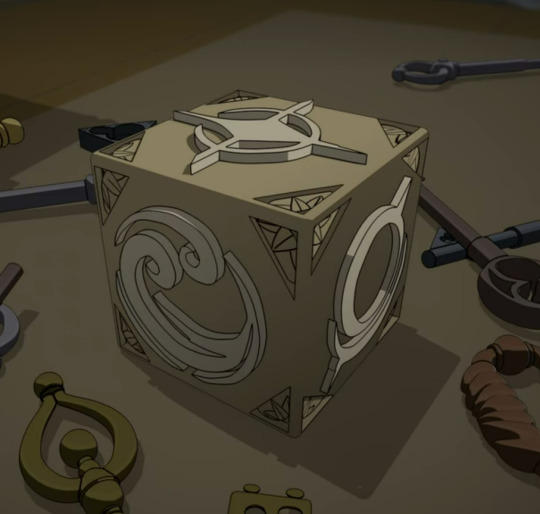
More than one use has been hinted at for the Key of Aaravos. We've heard Rayla refer to it several times as a toy and a game piece (1x04, 2x07). In the book two novelization, Callum notices that the Key left marks on the ground that appeared to point toward Xadia (we get a glimpse of those lines in early episode 2x07). In 4x07, we get suspiciously up-close framing of the Key when Callum asks, "is there no primal gem for star magic?"
And a few months back, one of the TDP creators shared on Twitter about a season 6 scene that was eventually cut. In the scene, Callum holds the Key up to a symbol on a wall and says, "I'm gleaming the cube!" (if anyone remembers this twitter convo and can provide me a link to this, I would be so grateful)
This is the Key feature we're all most familiar with: its glow. When exposed to a source of magic, the corresponding primal magic symbol on the Key lights up. This is why I think one of the potential functions of the Key of Aaravos is as a cryptographic key. If it were held up to a magic-infused symbol, the glow effect would reveal the primal magic source - and in this way it could be used to decode a secret message.
In cryptography, a key is the series of words, symbols or phrases that contain all of the basic information you need to decode or understand a specific coded message. Both the sender and receiver of the coded message need to know the key in order to create the coded message or decode it into plaintext - to lock or unlock the meaning behind a cipher or code.
I can't speculate on the exact nature of the secrets that she encrypted with it, but the Key can literally shed light on the solution! It was a toy that was repurposed by a the Jailer, magicless human mage and mastermind of ciphers and codes, to protect the secrets of Aaravos and his prison.
Exactly what secrets it will be used to reveal remains part of the Mystery.
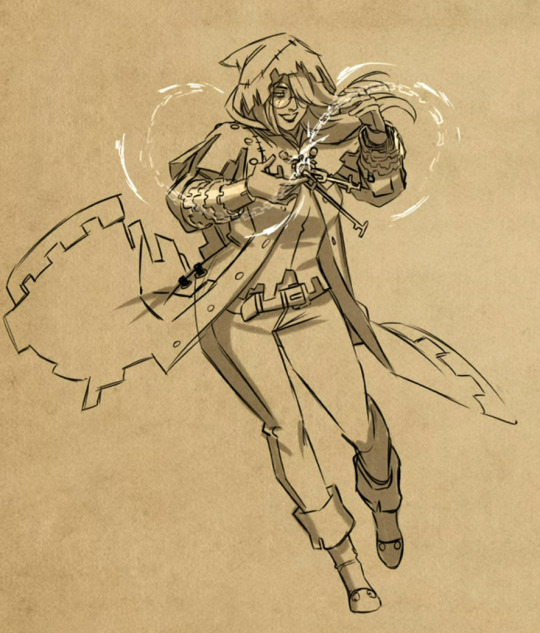
if you're interested in learning more about cryptography, this page has links to a lot of my favorite resources
Recommended reading for more Key of Aaravos and the Jailer theories:
the post that initially enabled my crazy train of thoughts, thank you @beautifulterriblequeen
super rad analysis of the Jailer's unique character design by @kradogsrats, who also authored one of my favorite alternative hypothesis for the real function of the Key of Aaravos
an amazing thorough and detailed Key analysis, by @raayllum and another very interesting conversation about the Key here
Special thanks to @raayllum for answering my random Akiyu and Jailer questions, and to @self-spaghettification for giving me the push I needed to bring this essay together!
#seriously y'all. tdp fans are the coolest and the smartest#i'm just trying to keep up#unravelling my tangled web of understanding and splicing together the threads into one coherent path so others can follow along#i could be totally wrong about the jailer and the cube. but this was a fun puzzle#the jailer#archmage akiyu#primal magic#dark magic#human magic#5x05#the key of aaravos#cryptography#tdp speculation#tdp headcanons#the dragon prince#tdp s6 predictions#whew ...what have i done#yes the puns are all intentional no this is not an apology#mine
52 notes
·
View notes
Text
Aaravos is deadass the "Dark Avatar" of TDP universe, and it's STILL a better concept than UnaVaatu.
15 notes
·
View notes